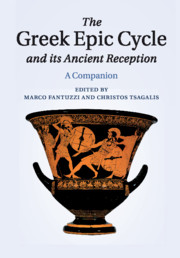Book contents
- Frontmatter
- Contents
- List of illustrations
- List of contributors
- Editorial note
- Introduction: Kyklos, the Epic Cycle and Cyclic poetry
- PART I APPROACHES TO THE EPIC CYCLE
- PART II EPICS
- PART III THE FORTUNE OF THE EPIC CYCLE IN THE ANCIENT WORLD
- 22 The aesthetics of sequentiality and its discontents
- 23 The Epic Cycle, Stesichorus, and Ibycus
- 24 Pindar's Cycle
- 25 Tragedy and the Epic Cycle
- 26 The Hellenistic reception of the Epic Cycle
- 27 Running rings round Troy: Recycling the ‘Epic Circle’ in Hellenistic and Roman art
- 28 Virgil and the Epic Cycle
- 29 Ovid and the Epic Cycle
- 30 Statius' Achilleid and the Cypria
- 31 The Epic Cycle and the ancient novel
- 32 The Epic Cycle and imperial Greek epic
- Works cited
- Index of principal passages
- Index nominum et rerum
29 - Ovid and the Epic Cycle
from PART III - THE FORTUNE OF THE EPIC CYCLE IN THE ANCIENT WORLD
Published online by Cambridge University Press: 05 August 2015
- Frontmatter
- Contents
- List of illustrations
- List of contributors
- Editorial note
- Introduction: Kyklos, the Epic Cycle and Cyclic poetry
- PART I APPROACHES TO THE EPIC CYCLE
- PART II EPICS
- PART III THE FORTUNE OF THE EPIC CYCLE IN THE ANCIENT WORLD
- 22 The aesthetics of sequentiality and its discontents
- 23 The Epic Cycle, Stesichorus, and Ibycus
- 24 Pindar's Cycle
- 25 Tragedy and the Epic Cycle
- 26 The Hellenistic reception of the Epic Cycle
- 27 Running rings round Troy: Recycling the ‘Epic Circle’ in Hellenistic and Roman art
- 28 Virgil and the Epic Cycle
- 29 Ovid and the Epic Cycle
- 30 Statius' Achilleid and the Cypria
- 31 The Epic Cycle and the ancient novel
- 32 The Epic Cycle and imperial Greek epic
- Works cited
- Index of principal passages
- Index nominum et rerum
Summary
An Epic Without Boundaries
If the adjective ‘Cyclic’ describes a kind of epic that aspires to be universal, all-inclusive, that is to say, based on an essentially anti-Homeric aesthetic, then it is difficult to imagine a more Cyclic oeuvre than Ovid's. Throughout his whole career, Ovid remained an ecumenical and inclusive writer. He is the only elegiac poet who refused to restrict himself to this single literary genre. Instead, he experimented with many others, even those that seem incompatible with elegiac sensibility, such as tragedy and epic, and he is nowhere more inclusive than in his major poem. The Metamorphoses is a decidedly comprehensive, omnivorous, non-selective, all-encompassing epic that accumulates, and does not exclude, anything that is narrabile. As the proem states, the narrative style of the poem is continuous (perpetuum, 1.4), that is to say: not Homeric, but Hesiodic, or, rather, Cyclic. After all, the notion of ‘continuity’ had long since been linked to the name of Hesiod, both because the genealogical Theogony was structured in this manner and because it was perceived as part of a Hesiodic Theogony–Catalogue–Erga sequence. In turn, scholars have often pointed out the evident influence of the Epic Cycle on the structural organization of the Trojan section of the Metamorphoses. More generally speaking, the idea of cyclicity is a necessary presupposition for the kind of ‘universal history’ that Ovid's poem presents. Its structure openly contradicts Aristotle's norm (Poet. chap. 23) that epic needs to be selective – like the Homeric and unlike the Cyclic model – and needs to make some a priori exclusions.3 Ovid in fact goes well beyond the scriptor Cyclicus who, as Horace deplores, gemino bellum Troianum orditur ab ovo (Ars 147: ‘begin[s] … the war of Troy from the twin eggs’): he begins much earlier, and ends much later, delineating the broadest narrative arc imaginable (prima … ab origine mundi ad mea … tempora ‘from nature's first remote beginning to our modern times’, Met. 1.3–4). In Ovidian as in Cyclic epic, there is no well-defined, circumscribed, ‘Homeric’ narrative arc, or any functional organization that assigns to the single narrative unit a role subordinate to the hierarchic structure that governs the larger story.
- Type
- Chapter
- Information
- The Greek Epic Cycle and its Ancient ReceptionA Companion, pp. 565 - 577Publisher: Cambridge University PressPrint publication year: 2015



